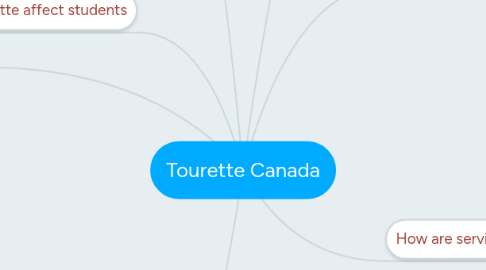
1. Fundraising
1.1. Text for Tourettes
1.1.1. Fundraising program
1.1.2. Download one of their pre-made signs, or make one yourself
1.1.3. Take a picture/selfie holding the sign
1.1.4. Post it on social media
1.1.5. When people text they make a $10 donation
1.2. Donate Your Car
1.2.1. Donate any unused car, motorcycle,boat, or RV and it will either be recycled or sold with all money being donated to Tourette Canada. Donators will receive a tax receipt.
2. Chapters
2.1. Chapter are located in Calgary, Greater Toronto, Halifax, London, Newfoundland, Saskatoon, Wellington-Waterloo, Edmonton, Greater Vancouver, Hamilton Halton and Niagara, Muskoka, Ottawa, Winnipeg, and Victoria
3. How does the agency address equity, inclusion and awareness of cultural diversity
3.1. Provide an welcoming and inclusive environment for all.
3.2. Services are available to ALL students, family's, educators, clinicians, and allied professionals regardless of race, colour, sexual orientation, sex, or religion.
4. How does tourette affect students
4.1. Accommodations
4.1.1. Social Emotional Climate
4.1.1.1. Peers may view a student with TS negatively because they do not understand the student’s condition. To create a more positive social-emotional environment, a teacher can work with students to encourage acceptance and understanding. Students and teachers can learn about TS through books and videos that portray individuals with TS in a positive way. Tourette Canada can provide a free presentation on TS to any classroom (to learn more call 1-800-866-3120).
4.1.2. Physical Arrangement
4.1.2.1. Students with TS often benefit from frequent movement breaks, a seat beside a more understanding classmate, and/or a seat near the door so that they can easily go to a safe, pre-identified space when they need to tic. Once in the safe space, students with TS can use relaxation techniques, such as listening to calm music, to reduce their stress.
4.1.3. Schedules and Routines
4.1.3.1. It may be helpful to schedule activities that require close attention earlier in the day and save classes that interest the student for later in the day. Often students with TS do not cope well with surprises, even pleasant ones. If there is a change in a daily activity, it is helpful to inform the student in advance.
4.1.4. Instruction and Assessment
4.1.4.1. Students with TS may struggle in school. They may experience difficulty starting and finishing assignments, difficulty answering a question in front of the class, difficulty with handwriting, and high anxiety during test-taking. To help students who have trouble starting and finishing work, teachers can provide the student with pre-determined cues to remind them to start or finish their work. Dividing homework into smaller segments may help make it easier to complete. The teacher can pre-arrange a question with the student prior to a group discussion to ensure that the student does not feel centered-out. The teacher can also pre-identify an “alert signal” that lets the student know that they will soon be called on to answer a question. This signal could be standing beside the student, or placing a printed cue card with the question on the student’s desk. Alternatively, teachers can provide the student with a list of questions that may be asked later that day. Students with TS often have trouble copying or taking notes. Alternative solutions include the use of a computer, allowing the student to record the lesson and write it down later, or providing the student with note-taking sheets. Test-taking can be a source of anxiety for students with TS. They often need extended time, a reduced number of questions, use of the computer or voice recorder, and an environment with very few distractions
5. What are the vision and goals of the agency?
5.1. Mission: Creating awareness and understanding of Tourette Syndrome through education, advocacy, support and the promotion of research.
5.2. Vision: An empowered Tourette community in an inclusive Canada.
6. What services/programs for Ontario students and their families?
6.1. High-quality, TS-related programs and services are available throughout Canada, and strive to be an outstanding source of support, resources, education and advocacy for TS and its associated conditions
6.2. Clients include children, youth and adults with TS, as well as their families, educators, clinicians and other allied professionals. We also support members of their community with whom they might interact, such as law enforcement agents and recreational centre employees. Below is a sample of the kinds of work we do for each of our clients.
6.2.1. For Children and Youth: School in-service presentations, National Conference, Special events/programs, Video resources, Online resources.
6.2.2. For Families: Toll-free information and referral line, Parent support groups, Parent advocacy resources, Parent workshops, School in-service presentations, National Conference, Book and video resources, Online resources, National and local newsletters, Peer-to-peer counselling, Special events.
6.2.3. For Clinicians: Online and book resources, Liaison with professional advisory board, Seminars and workshops, International symposia, Information pamphlets.
6.2.4. For Educators: Online resources, Video resources, School in-service presentations, Multimedia educator kits, Special events, Educator day at National Conference.
6.2.5. For Adults: National Conference, Adult workshops, Video resources, Online discussion forum, Socials and special events, National and local newsletters.

